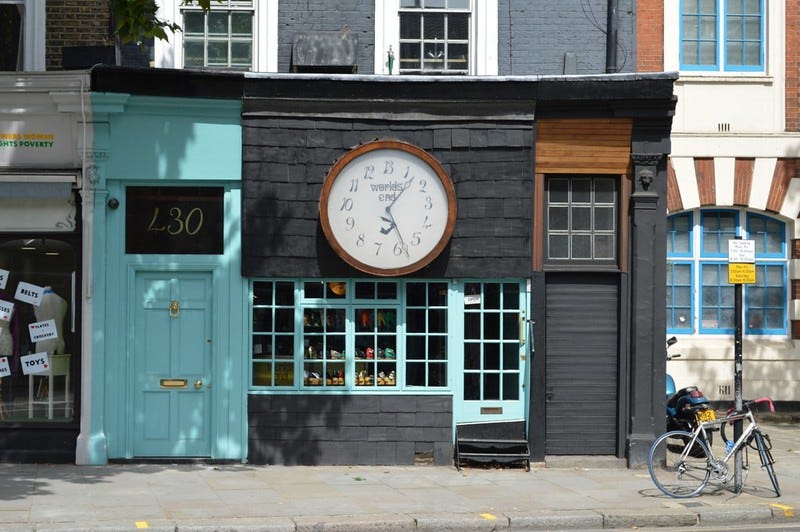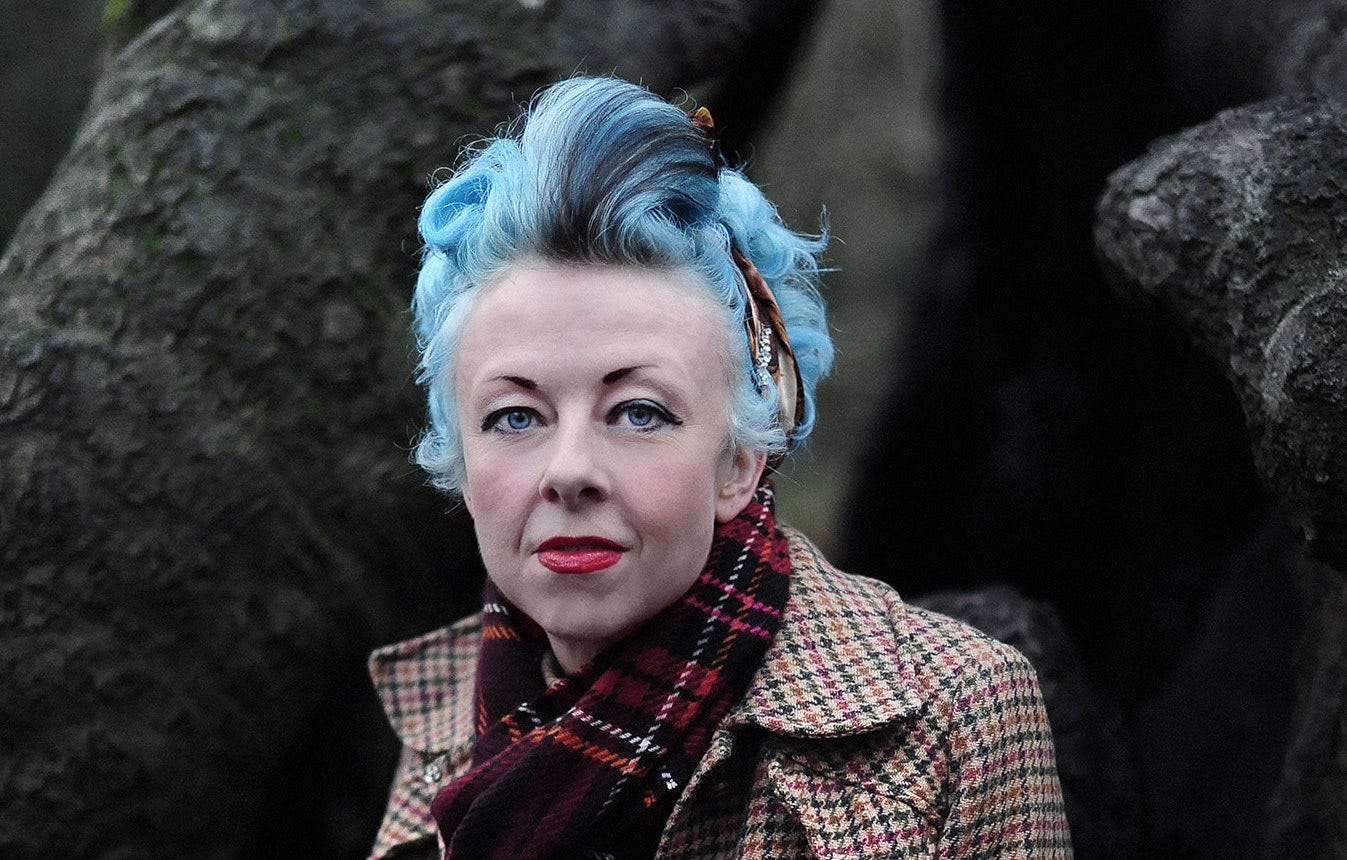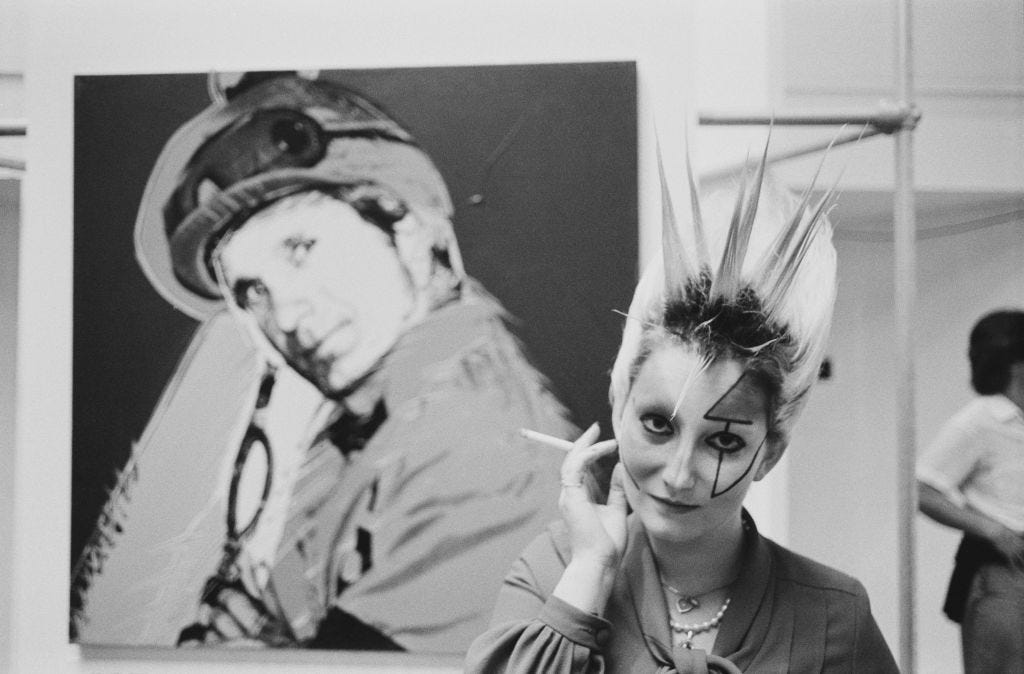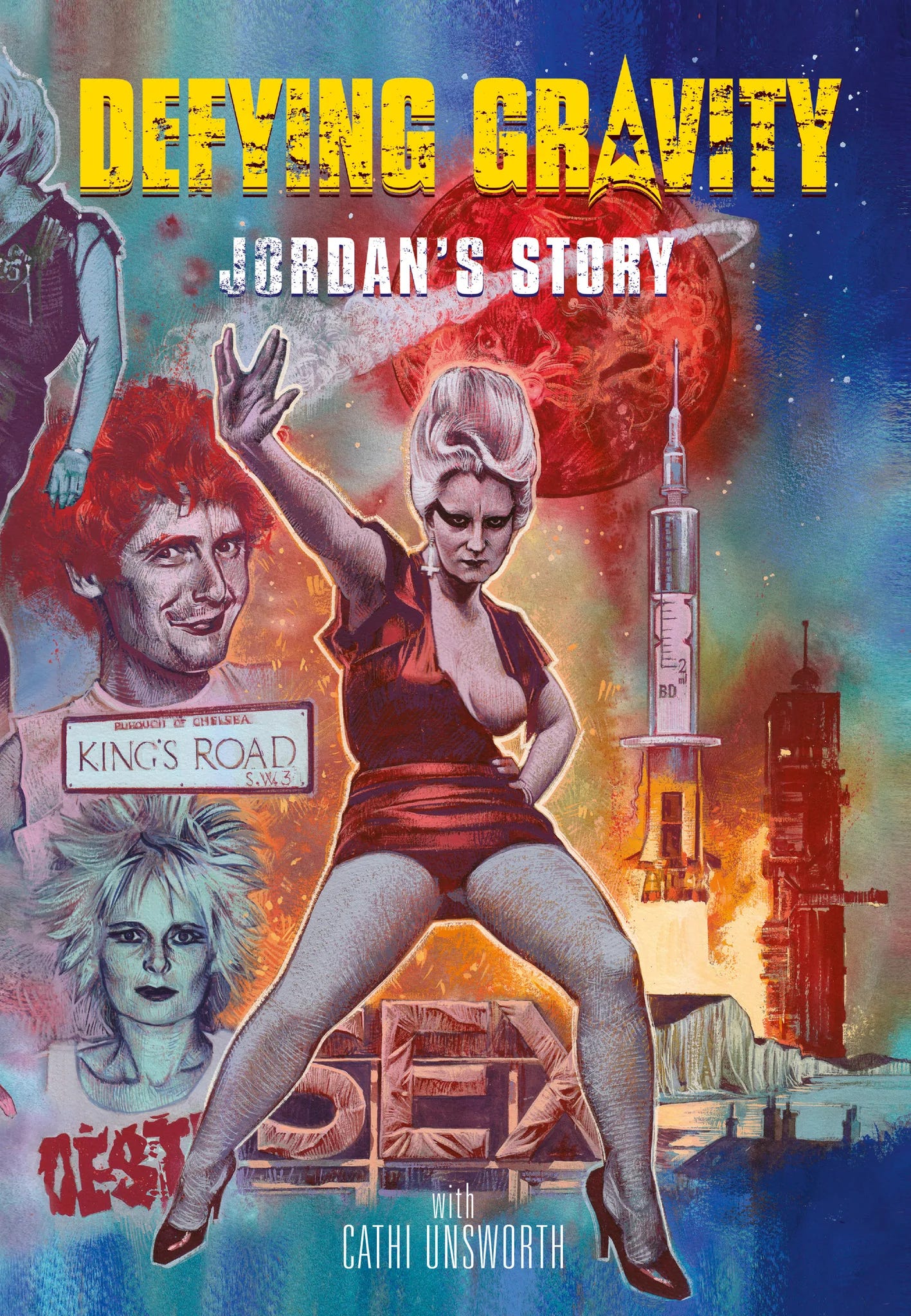Cathi Unsworth is a novelist, writer and editor who started her career as a freelance journalist for the legendary Sounds magazine and has gone on to write for titles including The Guardian, Financial Times, Fortean Times, Bizarre, Melody Maker, Mojo, and Uncut. She’s written six novels (including Bad Penny Blues, a noir crime thriller about Hammersmith’s unsolved 'Jack the Stripper' murders), but her most recent book is a work of non-fiction.
Defying Gravity tells the life story of the punk icon Jordan, from the childhood of a little girl called Pamela Rooke who dreamed of being a ballerina, to the King’s Road where Jordan met Vivienne Westwood and Malcolm Mclaren and began working at the legendary shop, SEX. The book recounts Jordan’s adventures with people like The Sex Pistols, Adam and The Ants, Derek Jarman and Andy Warhol, but it also serves as an alternative history of West London during that unique time.
Jordan passed away in April of this year, shortly before Danny Boyle’s series, Pistol was aired (featuring Maisie Williams as Jordan), but not before Defying Gravity was published to an incredible reception.
The book has just came out in paperback, so we took the opportunity to get Cathi on the phone to talk her about her experience of writing the book with Jordan, the history of punk, the importance of West London’s role in the scene, and her thoughts on Pistol.
What’s your history with London, Cathi? You’re not London born and bred are you?
I’m from Norfolk originally. I came to London at the age of eighteen to study at the London College of Fashion. That was in 1986. I was taking a course on fashion design and journalism but I was really obsessed with music and when I got to London College of Fashion I realised that I was more obsessed with music than fashion. Especially when I saw what the fashion world was actually like!
Luckily I got a placement to work at Reading festival for one summer and while I was there I met Steve Double, a photographer from Sounds music weekly. I asked him if Sounds took students and he said, “Are you joking? It’s run by students!”. The editor at Sounds, Tony Stewart, took me on for two weeks and then at the end of that he asked if I wanted to write for them freelance. That’s how easy it was in those days! I’ve made my living from words ever since.
The whole time I’ve lived in London I’ve lived in Ladbroke Grove. I first visited as a 16 year old and saw Portobello Road and I knew that Marc Almond lived around here, and I thought, “Well, no wonder he lives here, it’s brilliant!”.
I managed to get a flat here and I’ve lived, more or less, around this area or ever since. So I've seen a a lot of change.
You missed the whole punk scene in London by a few years, but you obviously have a real love of punk. Where do you think that comes from?
Punk was sort of over by the time I came to London, but I’ve got a huge formative memory of seeing the Sex Pistols for the first time on Top of the Pops and thinking that Johnny Rotten had come from outer space. He was really scary but really fascinating at the same time.
I got into punk because I lived a fairly isolated life in the middle of a field in Norfolk, so I go into music and listening to John Peel, and I used to make my own clothes. I loved Vivienne Westwood’s clothes and Lloyd Johnson was one of my favourites as well. There was a little Johnson’s outlet in Norwich and I remember saving up all summer to get a pair of La Rocka boots. They were great, they had DM soles and they lasted about 10 years, so they were a good investment.
All that DIY stuff was still very much part of my generation, as was the music, because it went on to to spawn so many different types of really interesting music. It just gave a whole generation a leg up; the kind of window of opportunity that doesn’t come along very often.
What I loved about people like Vivienne Westwood and Mary Quant is that they were really working class girls from the provinces. Part of what I realised at London College of Fashion is that fashion is not a very working class friendly industry. So for those two women to have made such as an astonishing mark on the industry is really quite something.
How did you come to get to know Jordan and to tell her story?
It goes back to Roger K Burton, who runs the Horse Hospital in Bloomsbury. I worked for Bizarre magazine from 1990-2002 and we did events with the Horse Hospital, nearly all my book launches have been there and I’ve done lots of live interviews with people there. I think of Roger as my ‘art dad’. He's got this amazing collection of costumes that he’s collected since the 70s and he’s had stalls on Portobello Road. He put out a fantastic book about the history of teenage fashion called Rebel Threads a few years ago, with examples from his collection superbly photographed in the Horse Hospital.
Roger knew Malcolm and Vivienne from the early 70s because they were all dealing in second hand clothes, traveling around the same places, getting the same dead stock from warehouses. Roger designed all the interiors of the current World’s End shop on the King’s Road. Roger made all the interiors with the help of Andy ‘Thunderclap’ Newman who in later life, became an electrician. In fact, when they opened that version of the shop, there was an actual ‘thunderclap’ because all the electrics that he put in blew up all at once.
I’d been working at this day job subediting on various women's magazines at Bauer Media, but I got made redundant. Just as that happened, Roger phoned me up and said “One of my friends wants somebody to work on her memoirs.” I thought it would be Jordan because I knew they were really good friends and he’d helped her when she’d auctioned some of her clothes from SEX and Seditionaries and World’s End. She’d had interest from other people about writing her life story, but she was very wary of doing it and she wanted to meet somebody that she would have a laugh with basically.
I went and did an audition chapter for her. I always think the most interesting bit of any of these stories is the bit before they were famous, so I asked her ‘What made you become Jordan?’. You might have seen that bit in [Danny Boyle’s] Pistol of her on the King’s Road with her see-through clothes on. I wanted to know what turned this little girl from Seaford who had dreamed of being a ballerina, into Jordan, the fearless Britannia of Punk!
She took me around Seaford and showed me the various sites and she told me about all the secret gay clubs of Brighton where she used to hang out as a teenager. So my audition chapter was writing about this secret world that made Jordan.
Jordan’s a hard person to pin down, because she wasn’t just a stylist or a model, or an actress, or a musician… She was all of those things and a lot more besides. Was that something that appealed to you or did it make writing her story that much more difficult?
Oh, it appealed to me. She’s a true original, and you can’t put her in any kind of box. That’s what people try to do with women all the time, put them in different boxes to shut them up. Jordan wouldn’t be shut up.
She did so much. She did all these amazing things with the Sex Pistols but she was also Adam Ant’s first manager. And she was utterly fearless but also quite modest about the whole thing, which is why she didn't want it to be a ‘me me me’ kind of memoir. She wanted it to be her life and times with the voices of all her friends and her brother and sisters.
She wanted all those people to have their voice in the story as well, so we did some really interesting interviews with lots of those friends and family, as well as people who worked in the shop with her, because that was such a fascinating world.

The King’s Road at that time was such a lightning rod for those kind of outsider characters. It was a place where people like Jordan could be accepted and thrive. I’m not sure physical places like that can exist today, as culture is so much more atomised and the niches are so much smaller.
It’s sad isn’t it? It's like not having Top of the Pops anymore. There isn’t that one place that can bring people together. You can’t find a gang like Jordan and the Pistols and the Ants or places like the King’s Road shop and the Roebuck pub. That’s where you get your strength and courage from, which I don’t think you can find online in quite the same way.
King’s Road was such an important ley line, even before the days of Mary Quant. Oscar Wilde used to live there. It’s got this amazing history which I try to put as much of in the book. Jordan really wanted it to be seen as a history book, so there’s quite a lot of the history of King’s Road in there and how it fits into the psyche of punk. For example, some of the key scenes from A Clockwork Orange were filmed on the King’s Road and that was obviously a massive influence on punk. And Dracula A.D.1972 of course! It all contributes to the history of this place.
These meeting points like King’s Road and Ladbroke Grove and Soho… They’re all flashpoints where great things happen and there’s layers and layers of it going back into history. In fact, in the World's End shop itself there’s a Hogarth etching of Old Father Time waiting at the world’s end with his scythe, and that's what Roger took the inspiration for the backwards-running clock with thirteen hours on it.

That area of London shifted so rapidly. It went from SEX to Sloane Rangers very quickly. Do you think the West London of Jordan’s time has gone for good? Could it ever come back?
It’s funny, if you look on the cover of Peter Yorks’ Style Wars book you had Jordan on one side and a Sloane Ranger on the other! But, yeah it definitely lost its edge, thanks to Hugh Grant and that blue door, which meant all the Americans were suddenly not scared to come here!
One of the greatest bits of ‘art’ I've seen recently was an old, disgusting mattress that somebody had dumped just off Powis Square where Performance was filmed. Someone had drawn a massive knob on it and underneath they’d written ‘Gentrify This!’. That suggests to me that the spirit of Ladbroke Grove survives at least.
I was lucky enough to talk to Keith Waterhouse once about his book, Soho, and he said something to me along the lines of, “You know, they do try and make a place respectable, but if you wait long enough on a street corner, then the old place will start to reappear.” And it’s true. If you hang around a lot, then you will see something of the old West London. It’s not dead.
What was the reception to Defying Gravity like when it was first published?
It was amazing. We did three Rough Trade events and after every night people would come to have their book signed and this would go on until the venues had to close. It was like everybody wanted Jordan to be their older sister.
They were so full of love and they would bring stuff like old magazines they’d collected and pictures of her. There were people of her age who would bring their children who really wanted to meet Jordan. That’s amazing when you think of all the scandal and outrage at the time! I remember a segment on TV when someone wished sudden death on the Pistols (below) and now there’s just nothing but love for Jordan.
We went everywhere promoting the book. Jordan went around the world for a year. I’m so glad that we got that in when we did, because if it had been a year later, we wouldn't have been able to do any of it because of Covid.
When our publisher first said they wanted to do the paperback, Jordan and I were going to get together and talk about it. But of course that never happened because she got ill. She got ill very quickly. It was two months from diagnosis to when she died.
It sounds like it was a great experience for Jordan though, revisiting that life and that world, even for a little bit. Because she left London and punk behind quite abruptly didn’t she?
There were factors behind her leaving when she did and it was to do with her marriage to Kevin Mooney and becoming a heroin addict. She wanted to save herself from that. She split from Kevin in quite terrible circumstances and went cold turkey at her parents without her parents realising. But then, while she was back there, she retrained and became a veterinary nurse. She had a really long and happy career doing that. Jordan’s basic philosophy was that you’ve got to do something that fulfils you and which you can excel at. For her, that was animals.
She realised had an aptitude for it because one of her sisters had a sheep farm in Yorkshire and one year her sister’s husband got ill around the lambing season and Jordan jumped straight in and delivered all these baby lambs with no prior experience. That's the kind of amazing person she was. She could go from punk to land girl!
There was nothing Jordan wouldn't do, which could sometimes be her downfall, but it was also her strength.
What was your take on the Danny Boyle series, Pistol? Was the portrayal of punk and of Jordan accurate as far as you’re concerned?
I think that Maisie Williams looked beautiful as Jordan. But she’s like a Tinkerbell version of Jordan! There’s one scene where she's staggering along carrying a TV so she can throw it out of a window. The real Jordan would have just picked the TV up and hurled it, no problem.
What Pistol doesn't really get across is just how scary she appeared to be, and part of that was her physical strength built up from years of sport and ballet. But also – and Steve Jones says this in Lonely Boy, his book that Pistol was derived from – he was terrified of her.
Jordan worked on Pistol, she was a consultant on it. But it’s difficult to see how much they listened to her, because what I saw on the screen was not really very accurate. Especially considering they had access to all of the people who could tell them what happened.
Have you made any changes to the paperback version of Defying Gravity? Is there anything you wanted to change or add, especially since Jordan died?
In the time that was available to me all I could really do was make some corrections to a few inaccuracies that eagle-eyed readers had pointed out to me. Then I got a page and a half to write an afterword, so I tried to gather my thoughts and write an epitaph.
Well, you’d already written an entire book together…
Yes, and that stands. It was what Jordan wanted it to be and it meant she got to feel the love of everybody. I should say that she really enjoyed working on Pistol as well. She was so happy.
You can buy the paperback of Defying Gravity here. Or there’s a beautiful limited-edition deluxe box set version of the book available here.
You can follow Cathi on Facebook here.
Cathi will be appearing at Dalston Rio on 17 September with Arena documentary maker Paul Tickell and ‘Berlin’ Bertie Marshall for a screening of Paul’s Punk and the Pistols film featuring Jordan and an accompanying talk, hosted by Travis Elborough.







